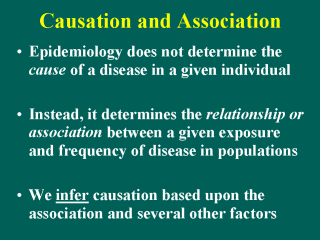| front |1 |2 |3 |4 |5 |6 |7 |8 |9 |10 |11 |12 |13 |14 |15 |16 |17 |18 |19 |20 |21 |22 |23 |24 |25 |26 |27 |28 |29 |30 |31 |32 |33 |34 |35 |review |
 |
-- Therefore, an
epidemiologic study cannot predict the exact cause of the disease in every
individual -- It looks at a population and tries to determine whether exposure is significantly associated to the disease on average - uses statistical techniques to make conclusions about the strength of these relationships -- Often these relationships are more strongly supported/concluded when a plausible biological mechanism exists for the effect -- In general, epidemiologic studies are not experimental - canít expose humans deliberately to something that may affect their health, instead often look at populations that were inadvertently exposure to an agent due to job or where they live (clinical trials is exception) |